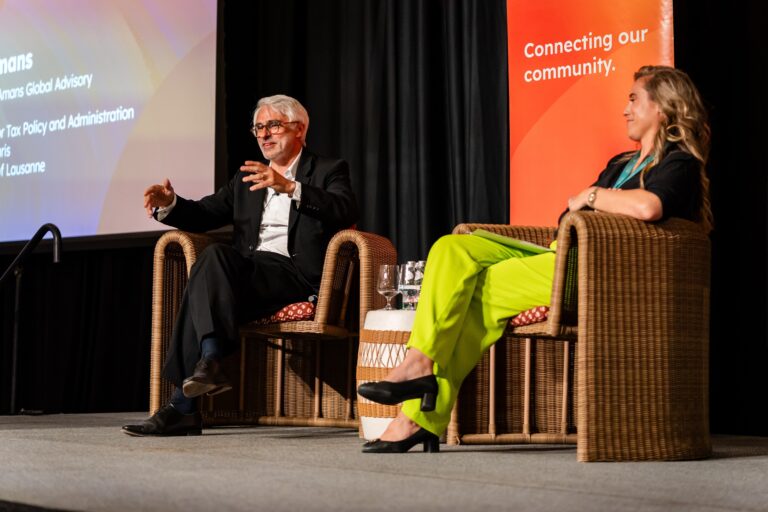
International tax expert Pascal Saint-Amans reflected on the impact of US policy shifts under the Trump administration on the global tax system at Cayman Finance’s member event on 8 May.
The former head of tax policy at the Organisation for Economic Cooperation and Development (OECD) outlined the trajectory of international tax reform from the 2008 financial crisis to present-day initiatives. He noted the importance of the G20 in elevating tax cooperation and the OECD’s role in implementing global standards such as the Common Reporting Standard and the Base Erosion and Profit Shifting (BEPS) project.
But the rollback of international agreements by the United States and the re-emphasis on tariffs over tax cooperation in combination with tensions between the US and Europe, the developed and the developing world, and between international organisations like the OECD and the United Nations, he said, has created “a mess and big uncertainty”.
Saint-Amans, now a partner at Brunswick and tax professor at Lausanne University, discussed the challenges of implementing Pillar One and Pillar Two of the OECD/G20 tax framework, particularly in light of the US withdrawal from global tax agreements under President Trump.
He said while Pillar One, which reallocates taxing rights to market jurisdictions, remains unfinished and contentious, Pillar Two, which imposes a 15% global minimum tax, is still gaining traction.
The global minimum tax can function, even without US or Chinese participation, as long as there is a critical mass of countries adopting it. This has been achieved, he argued, with more than 50 countries implementing the standard, including all EU nations and the G7, minus the US.
Although Pillar Two might be modified with potential adjustments that will benefit the United States, it is likely to remain.
The Cayman Islands has not implemented Pillar Two. Because investment funds are exempt, and Cayman is tax neutral, there is no immediate pressure on the islands’ financial sector to do anything, as what would be impacted is small and most likely American.
“[The impact] is probably marginal for Cayman, but it’s important to understand where the world is going, what it means for you,” Saint-Amans said, suggesting Cayman should remain flexible, monitor global tax policy trends, especially as the United Nations explores its own tax initiatives, and conduct impact assessments accordingly.
Compliance costs offset by reputation gains
International tax initiatives impact Cayman mostly in the form of transparency and compliance. Saint-Amans emphasised the significance of compliance with international tax standards, especially for jurisdictions like the Cayman Islands that are frequently labelled as tax havens.
He said that label is “unfair because of the changes you’ve been through for the past 15 years, and we’ve worked closely with you, but reputations take forever to change”.
The tax expert suggested Cayman needed to rebrand into an ‘investment hub’, improve its communications about the funds industry, which is tax-exempt in most countries anyway, and continue to demonstrate transparency and cooperation.
In a fireside chat with Louise Somers, Mourant’s Head of Tax Reporting, he acknowledged that while compliance is cumbersome and costly, it is necessary to retain financial sector business.
“The cost of compliance is too high… but what does it bring to you? It brings reputation.”
In this context, Saint-Amans noted that Cayman’s tax administrator, the Department of International Tax Cooperation, had gained the respect of its international peers and suggested Cayman should leverage its standing in global forums to influence policy decisions.
Climate change a global tax challenge
In his concluding remarks, Saint-Amans pointed to challenges for international tax cooperation.
Highlighting the US’s stance on climate change and its impact on global tax policy, he said while carbon taxes and aviation levies are being considered in Europe, the US has largely ignored such initiatives.
The Cayman Islands, as an island, is particularly vulnerable to climate change impacts, he said, and should be interested in the large countries finding a solution by starting to tax carbon.
Saint-Amans, who is involved in developing policy recommendations as an expert in the Global Solidarity Task Force, said aviation and shipping taxation strategies should be prioritised.
Shipping alone represents about 3-4% of global emissions but pays almost no tax. “It’s wrong, plain wrong.”
Overall, he said: “70% of carbon emissions are priced at zero. The remaining 30% are priced at five euros per ton. The right price is probably around 80 to 120 euros.”
























